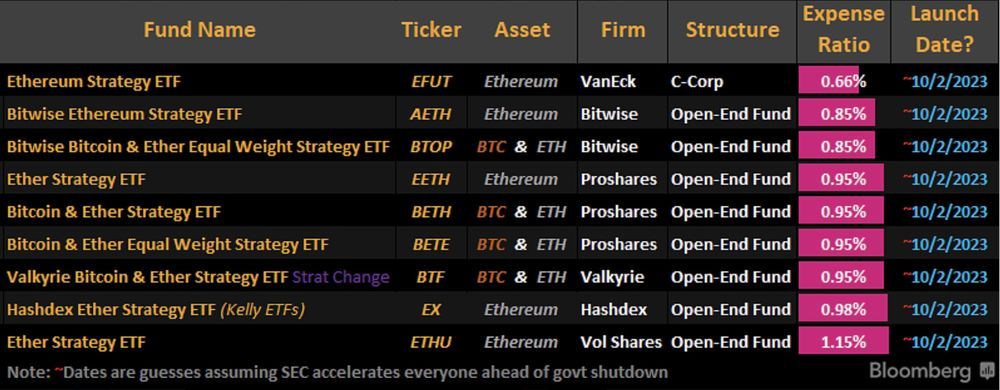Table of Contents
About a year ago, TradFi was taking the moral high ground as the crypto industry crashed and burned at the mercy of FTX. Fast forward to late 2023, and institutions are aping heavily into the Web3 space.
BlackRock, WisdomTree, Invesco, Fidelity, Valkyrie Digital and ARK Invest are among the growing list of institutions filing for Bitcoin ETFs with the SEC. This week also saw the debut of seven ETFs tied to ether futures. Even HSBC, notoriously anti-crypto, announced its support for customers to trade cryptocurrency ETFs in Hong Kong.

According to Binance's Institutional Crypto Outlook Survey, half of those surveyed said they are expecting to increase their allocation over the next year, whilst 63.5% are positive about the crypto outlook over the coming year.

Singapore-based multifamily office Whampoa Group is set to launch a $100 million venture fund by the end of the year to focus on Series A financing for Web3 and digital asset projects.
Saison Capital, the venture arm of Credit Saison, is also allocating $100 million for venture capital investments for both Web2 and Web3 initiatives, having completed 42 deals in the blockchain space.
Over in Hong Kong, CMCC Global has raised $100 million for its new Titan Fund to support Asian blockchain startups. Over 30 investors participated in the fund's first round, including Block.one, Pacific Century Group, Winklevoss Capital, Jebsen Capital, and Animoca Brands' founder Yat Siu.
Keeping Up The Kiasu
Unless we missed something, we're pretty sure we're still in a bear market. The last time we checked, Bitcoin was struggling to surpass $30,000; a battle the world's biggest cryptocurrency has been facing throughout the year. But yet, institutions are clamouring over one another to list Bitcoin ETFs. Sure, buying low and selling high is the ultimate investing mantra, but it's not like there is any immediate optimism or strength to leverage in the market.
Is it all just peer pressure? As soon as BlackRock filed its Bitcoin ETF application, a slew of its peers followed suit.
There is nonetheless, some strategy behind TradFi capitalising on Web3 in the present day. "Many investors are looking at investment opportunities where you can combine blockchain crypto with traditional financial services," said Qin En Looi, principal at Saison Capital.
Venture firms are also considering crypto-based funds. "We are not only early-stage VCs, but we also invest in funds," Looi said. "We are looking to grow our fund portfolio more from Web2 to Web3."
For the Titan Fund, exchanges will not be the fund's primary focus, as the segment is already highly saturated. Instead, the fund will make equity investments in early-stage blockchain startups, with a focus on the Hong Kong market. Specifically, the fund will invest in blockchain infrastructure, consumer applications such as gaming and NFTs, and financial services.
“There’s enough exchanges in the world, I think, and they’re well capitalised,” Yen Shiau Sin, managing partner of Titan Fund said. “It’s very difficult for new incumbents to enter with what’s happening in Hong Kong, with the most recent blow-up.”
Net Positive
As Web3 fans ourselves, the reasons why anyone including TradFi would be drawn to the industry are obvious. Better returns, higher liquidity, passive staking, and capital efficiency such as tokenization are just a few investment opportunities the Web3 world can offer. But it's been an ethos we've recognised for a while, so why are TradFi bros choosing now to invest?
Animoca's Yat Siu told Blockhead, "For traditional finance, they understand its appeal. It's not just about being a better or more useful asset; it's also about where the next generation is thinking the value of these assets lies."
"For younger people, virtual and digital existence is more important, so engaging with virtual-related assets makes sense," he added.

Tyler Winklevoss said the shift was an inevitable one. "There have been different moments over the past decade where we thought that institutions were coming and showing up," he said to Blockhead.
"I think there's been like moments of that where you say macro traders in the TradFi world and take Bitcoin positions and understand hey, that it's a store of value, there's a fixed supply, it's an alternative to fiat and money hedged inflation, all of those gold 2.0 and talking points thesis."
Ultimately, the new wave of investors and their Bitcoin ETFs will provide more liquidity, creating an even more enticing environment to invest in. "I think the next wave will be ETFs and that's going to bring a ton of liquidity and price discovery," Tyler explained.
"We have many institutional customers, and they range from proprietary trading firms to large macro hedge funds," he continued. "And I think we're going to see 10x that once ETFs arrive."
Stay tuned for Blockhead's full Winklevoss interview dropping soon.
Smarter Deals
Despite the surge in crypto ETF interest and encouraging fundraising, the value of global venture capital investments in crypto firms actually declined 70.9% in Q2. Harsh market conditions understandably caused investment to dry up. But harsh market conditions are not necessarily a bad thing either, as weaker projects have been weeded out as a result. In a tough market, deals are smaller but quality is higher," Looi said.
"The noise level has gone down, but investors remain active. It is now slightly easier to discover high-quality companies, as random projects are disappearing. Basically, the tourists have left."
Venture capitalists and TradFi bros might seemingly be aping into the space but smarter deployment is fundamental in the space. Crypto ETFs are proving the most popular investment vehicle, which could open up the industry to more Web2 investors.
Elsewhere:
- JPEX Triggers Alliance for Hong Kong Authorities: The Hong Kong Police Force (HKPF) and the Securities and Futures Commission (SFC) have formed a crypto task force following the JPEX scandal. SPC had accused the Hong Kong-based exchange of operating without a license. The new supergroup will focus on monitoring and investigating illicit activities by Virtual Asset Trading Platforms (VATPs). The group comprises of SPC's enforcement division and HKPF officials specializing in commercial, cybersecurity, and financial intelligence and investigations.
- HKEX Launches Blockchain Settlement: The Hong Kong Stock Exchange's (HKEX) Stock Connect system is being upgraded to use blockchain technology. Stock Connect connects Hong Kong's and mainland China's stock markets. The new system, called Synapise, utilises smart contracts to streamline post-trade workflows and reduce settlement risk. Synapse will launch on 9 October and has the capability to simultaneously create settlement instructions for all participants in the settlement chain.
- Bank of Korea Tests Wholesale CBDCs: The Bank of Korea (BoK) is conducting a wholesale central bank digital currency (CBDC) test. Partnering with the Bank for International Settlements (BIS) and other institutions, the test assesses the feasibility of a monetary system built on wholesale CBDCs. The pilot will test the viability of wholesale CBDC as a settlement asset for tokenized deposits in commercial banks and will test the programmability of these tokenized deposits. The BoK previously conducted retail CBDC trials but deemed retail CBDC as unnecessary due to the efficiency of the Korean payment industry. Instead, the BoK believes the country should be prepared for the potential introduction of a CBDC in the future.










